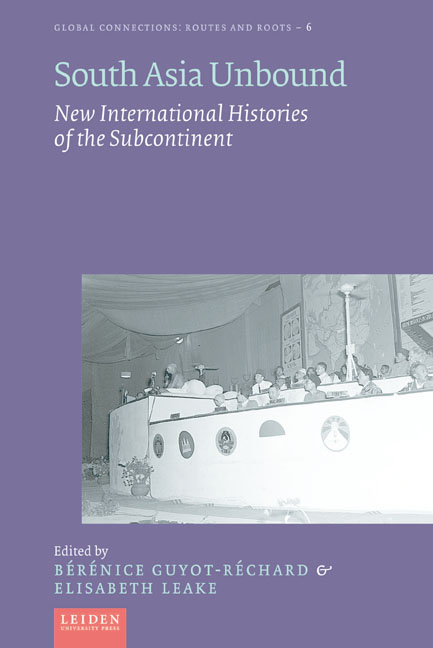Book contents
- Frontmatter
- Contents
- List of Illustrations
- List of Contributors
- Acknowledgements
- Acronyms and Abbreviations
- Introduction. South Asia Unbound
- Part I (Inter)national Orders and State Futures
- Part II From the Transimperial to the International: Lived Uncertainties
- Part III South Asian Roots of the International
- Part IV Ambivalences and Sensibilities of Internationalism
- Afterword
- Index
Chapter 10 - Hindu Nationalism in the International: B.S. Moonje’s Travel Writing at the Round Table Conference
Published online by Cambridge University Press: 04 January 2025
- Frontmatter
- Contents
- List of Illustrations
- List of Contributors
- Acknowledgements
- Acronyms and Abbreviations
- Introduction. South Asia Unbound
- Part I (Inter)national Orders and State Futures
- Part II From the Transimperial to the International: Lived Uncertainties
- Part III South Asian Roots of the International
- Part IV Ambivalences and Sensibilities of Internationalism
- Afterword
- Index
Summary
Abstract This chapter provides an early account of Hindu nationalism emerging through the spaces of British imperial internationalism. The diary entries of Dr. B.S. Moonje during his journeys to and experience of the Round Table Conference sessions (1930-32) in London are read as a form of travel writing. Moonje admired British science and militarism but denounced its gendered cosmopolitanism, especially when expressed in the Indian diaspora. His fiercest ire was reserved for fellow Hindu delegates, whom he felt were outplayed by the disciplined Muslim delegates. Moonje took back to India a heightened sense of communal crisis but also a heightened desire to militarize India's Hindu youth, both products of this brief but formative interwar international moment.
Key words: communalism, conference, imperial, London, Hindu, Muslims
The Round Table Conference (1930-2) marked the first time that Indian representatives had been directly invited to London by the British government to engage in constitutional debate. Over three sessions the conference worked up detailed proposals for India's political future within the British Empire. The resultant scheme was for an all-India federation of the “British” and “Indian” (or “Princely”) States with safeguards for minorities and reservations for continued British supremacy and paramountcy.
The conference, in one sense, fitted into an older tradition of colonial and then imperial conferences through which the British invited delegates of the white settler colonies, and later India, to confer. However, beyond the breadth of delegates brought to London (although they were still nominated, not elected), it marked something new. This conference fitted into the interwar paradigm of modern, international conferencing. This paradigm combined histories of diplomatic congresses with the more technical, scientific conferences which emerged in the mid-nineteenth century. The League of Nations was the model of this new form of conferencing but various strands of internationalism modelled the liberal conference into their own shape. The Round Table Conference (RTC) marked an “imperial international” form of modern conferencing. It attempted to reconcile the rival demands of delegates who were explicitly categorized by the British into separate camps. Both British Indian and Princely delegates were divided by their religion and their politics. Some of the latter were subdivisions of the former, such as the liberals, who refused religious designation but were mostly classed as Hindu. Others, such as trade unionists or commerce delegates, crossed religions.
- Type
- Chapter
- Information
- South Asia UnboundNew International Histories of the Subcontinent, pp. 227 - 246Publisher: Amsterdam University PressPrint publication year: 2023

